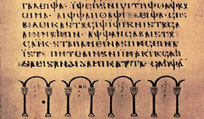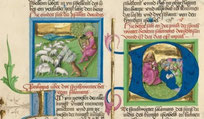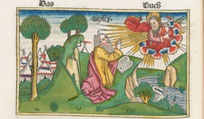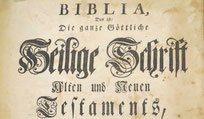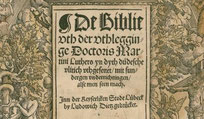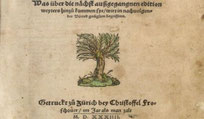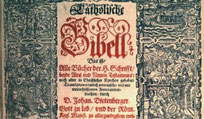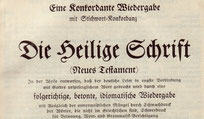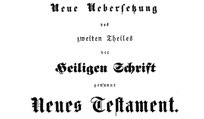GERMAN BIBLES - ONLINE FACSIMILES
Germany is the land of Bibles. In no other country has there been such a great variety of the written and printed Word of God over the centuries. So many German Bibles were produced that a chronological classification is necessary: Even before the Latin Vulgate (382 AD), there was a Germanic Bible, namely the Gothic Bible (350-380 AD) of Bishop Wulfila. After that, more than 150 German Bible translations were made in handwritten form (the manuscripts). Some of them were very precious and decorated with color and gold paintings. Since the invention of printing by Johannes Gutenberg in 1542, the Gospel could increasingly reach all households. The Luther Bible was not the first German printed edition, for there were already 18 printed Bibles before it, the so-called pre-Lutheran Bibles. In addition to the Martin Luther Bible 1522-1545, the Zurich Bible and the Low German Bible were also published around the same time. The Catholic Church, which until then had only allowed the Latin Vulgate, had to publish three counter-Bibles to the Luther Bible because it wanted to prevent Catholics from also reading Protestant Bibles to learn about the Gospel. In the period that followed, many other Bibles of various kinds were produced. It is possible to download facsimiles of historical online Bibles in PDF format for free:
German Bibles from all Centuries:
History of the German Bibles
The Reformation and Bible Production
At the time of the first Christian church (1st century A.D.) the scrolls of the Bible were repeatedly copied by hand and distributed in churches and households. Since the manuscripts consisted of papyrus or animal skins, they were not durable for long and had to be stored carefully and copied again and again. There were very few people at all who had all the 49 scrolls of the Bible at their disposal. Already early there were translations of the Greek texts into other languages. In the course of the following centuries, almost only Latin Bibles were produced, since the Catholic Church had no interest in everyone being able to read and interpret the Bible themselves. Therefore, Bible reading was mostly reserved for priests until the Middle Ages. Wycliffe and many German translators were already far ahead of their time, because they produced Bibles in the national language. But they were manuscripts, far too rare and far too expensive, so that hardly any Christian could afford a Bible. It often took a monk a whole year to copy a Bible. In addition, the writing material was a luxury article. All this made the Bibles extremely expensive. Since the invention of printing with movable letters by Johannes Gutenberg (Wikipedia) from Mainz (Wikipedia), it was possible from 1452 to produce Bibles in large numbers and thus inexpensively. However, the first prints were in Latin, so that the people could not understand them again. There were 18 printed German Bibles before Luther, but their purchase was impossible for ordinary citizens. With the beginning of the Reformation the situation changed abruptly, because the goal of the reformers was that everyone could read his own Bible in his own mother tongue. Unfortunately, most Christians around the world are not aware of the privilege of having their own Bible. Billions of people before us could never fully read the Word of God.
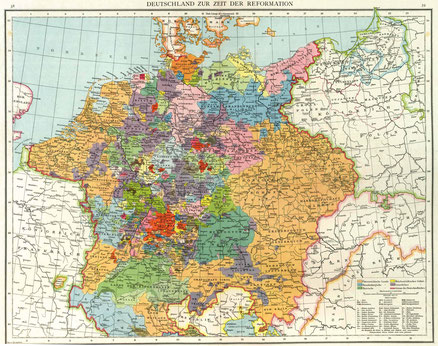
The Reformation began in 1517 in the centre of Europe in the then "Holy Roman Empire of the German Nation" (Wikipedia). It was the domain of the Roman-German emperors from the late Middle Ages (about 1250 to 1500) to 1806. The borders were shifted several times in the course of history and were recognized by the respective popes.
The German Empire was not a nation state like the neighbouring states France or Poland, but consisted of numerous individual, mostly German-speaking tribal duchies, which competed with each other. In addition, there was no uniform language, but many dialects of Lower, Middle and Upper German. French was also spoken in the West, Czech in the area around Prague and Polish in the eastern border areas.
For the educated, Latin was the most important economic, medical, scientific and ecclesiastical language throughout Europe for centuries. Therefore, until the Reformation, the Bible was usually only in the form of the Vulgate, while the German-language Bibles were reserved for small, select circles such as kings or priests (monasteries). The common people were therefore unable to read the Bible until the Reformation and were dependent on the interpretation of the theologians. However, they often had their own interests and did not teach the discipleship of Jesus.
The individual principalities of the empire were at odds with each other with regard to religious affiliation. The sovereign often determined the religion and the people had to follow it to a large extent. As a result of the Reformation, the production of Bibles in one national language was extremely promoted not only in Germany but also throughout Europe. Printers from Germany went to Sweden, Denmark, Poland and other European countries, where all kinds of writings were produced. What had been completely unthinkable for 1,500 years: now more and more people could afford their own Bible in their mother tongue. The North German territories followed the Reformation movement. Their aim was to return to the origins of Christian doctrine. The southern German states (especially Bavaria) refused to accept the new faith. They defended the Catholic teachings. For them the continuation of the previous traditions was more important.
The Spanish king and later German emperor Charles V (*1500, †1558; Wikipedia), who was crowned in 1530 by Pope Clement VII (*1500, †1534; Wikipedia), tried with all his might to prevent a split of faith and to preserve the Catholic unity of faith through the use of force. He did not succeed in this and there was an uprising of the aristocratic princes and terrible wars of faith, which only came to a temporary end with the "Peace of Augsburg" in 1555 (Wikipedia).
Martin Luther (*1483, †1546; Wikipedia) did not want to divide the Catholic Church, but to eliminate the grievances in the Church and reform it (Latin reformatio means renewal). But instead of change, there was an unwanted division of the church, in which much blood was shed by violence. Luther was also excommunicated and persecuted, and many of his Reformation friends in Europe were burned at the stake. However, being under the personal protection of a secular prince, he was able to escape the punishments of the Catholic Church. Not only his German translation of the Bible was a problem, but also his open criticism of the Catholic Church, celibacy, letters of indulgences and the worship of saints and Mary. He did not care about church doctrines and dogmas, for him the biblical word was decisive.
Luther called the Pope the Antichrist. The Pope in turn called Luther a heretic and Antichrist. The Reformation did not only lead to conflicts and wars between principalities and countries, but also within individual families. The many historical and new maps show the "Holy Roman Empire of the German Nation", strongly fragmented into individual principalities, and its religious orientation. It should be noted that the situation could also change at short notice, especially in the course of the Counter-Reformation. Upper Silesia, for example, was Protestant for a short time, then Catholic again. The Second World War had terrible consequences, as 12 million Germans were expelled from the former eastern territories of Pomerania, Prussia and Silesia. In contrast, the Poles who followed (and were often expelled from Eastern Europe themselves) were mostly Catholic.
The mass production of Bibles begins
Since the invention of the printing press with movable letters by Johannes Gutenberg, a mass duplication of literature that had hardly been possible until then has become possible. Since the Luther Bible, published in September 1522, was reprinted many times, the Catholic Church also had to follow suit and offer its members its own Catholic Bible. This was to prevent Catholics from coming into possession of a Protestant Scripture. There were 3 official Catholic counter-Bibles (or correction-Bibles) and there was a real competition in the spreading of the Word of God. This was even more favoured by the Canstein Bible Institute (Wikipedia), the first Bible Institute in the world. In Germany the spreading of the gospel was strongly promoted and the necessary printing technology was exported to the whole world.
The Blessings and Warnings of the Bible
Today we can have not only one, but hundreds of Bibles, because many original editions are available in digital form as facsimiles free of charge on the Internet. They are historical witnesses of a very moving time. Nevertheless, many do not understand the Bible because they do not read it. A true Christian is only the one who follows Jesus Christ in the way of love. But anyone who calls himself a Christian, commits adultery, does violence to others and lies, denies Jesus with his actions. A Christian is also only the one who has the love and the Spirit of God. "If anyone does not have the Spirit of Christ, he does not belong to him" (Rom 8:9). The only reliable sign of a Christian is love. It is the effect of the Holy Spirit, for God is love itself. The possession of a Bible alone will not save anyone from eternal death. The Book of Life contains only the names of the righteous who not only read the Bible, but also walk the path of love.
The country of origin of the Bible is Israel. The Old Testament was written in Hebrew and all Greek New Testament writings were written by 8 people from the Hebrew people (see Structure of the Bible). This is a fact that few Christians are really aware of. Therefore, anti-Semitism is always directed against Christianity, because without the Hebrews we would not have the Word of God.
Jesus said: "Therefore all things whatsoever ye would that men should do to you, do ye even so to them: for this is the law and the prophets. Enter ye in at the strait gate: for wide is the gate, and broad is the way, that leadeth to destruction, and many there be which go in thereat: Because strait is the gate, and narrow is the way, which leadeth unto life, and few there be that find it. Beware of false prophets, which come to you in sheep's clothing, but inwardly they are ravening wolves. Ye shall know them by their fruits. Do men gather grapes of thorns, or figs of thistles? Even so every good tree bringeth forth good fruit; but a corrupt tree bringeth forth evil fruit. A good tree cannot bring forth evil fruit, neither can a corrupt tree bring forth good fruit. Every tree that bringeth not forth good fruit is hewn down, and cast into the fire. Wherefore by their fruits ye shall know them. Not every one that saith unto me, Lord, Lord, shall enter into the kingdom of heaven; but he that doeth the will of my Father which is in heaven. Many will say to me in that day, Lord, Lord, have we not prophesied in thy name? and in thy name have cast out devils? and in thy name done many wonderful works? And then will I profess unto them, I never knew you: depart from me, ye that work iniquity" (Mt 7:12-23, KJV).
And how is it today?
Protestantism has changed greatly over the centuries and has become lukewarm. The Catholic Church has gained influence in most countries. Although many call themselves "Christians", they do not know what this means at all. In Muslim countries Bibles are increasingly forbidden; only the possession of a Bible is punished with torture and imprisonment. In contrast, many Bibles can be acquired very easily in any European country. But the fact is that few really care about the Word of God and the discipleship of Jesus. Most simply live by themselves and don't care what God has to say. They don't want any authority over themselves that tells them what to do and what not to do. Adultery, divorces, broken families, violence, wars etc. are the consequences.
The Bible is more important today than ever before. For it shows the true way of love, a way without violence, without fraud and without lies. It is the only light we have in this dark world. But how many people in the world are seriously interested in the Word of God? God gave people the Bible, but people do not want it.
Facsimiles and PDF of Bibles in several languages:
English Bible prints until 1699
